What is Odoo ERP & How It Can Transforms Your Business
- BLOG
- Software Development
- November 4, 2025
Struggling to manage multiple business processes in one place? Frustrated with disconnected software, repetitive tasks, and slow workflows? If so, you’re not alone.
Many businesses face these challenges when trying to scale efficiently. This is where Odoo ERP comes in. But what is Odoo ERP, and why is it gaining popularity among millions of businesses worldwide? In this article, we’ll explore Odoo ERP system, its powerful modules, key features and benefits, real-world use cases, and how it can transform your business operations.
By the end, you’ll understand why Odoo ERP for businesses is more than just software, it’s a complete solution for smarter, faster, and integrated business management.
Contents
- 1 What is Odoo ERP? A Complete Guide for Modern Businesses
- 2 What is Odoo ERP Used For? How Businesses Leverage Its Powerful Tools
- 3 Odoo ERP Features and Benefits: Why Businesses Choose It
- 4 Use Cases of Odoo ERP: Industry-Specific Applications That Work
- 5 Build a Smarter Future with Webisoft’s ERP Development Experts Today!
- 6 Understanding the Odoo ERP System: How It Streamlines Operations
- 7 Odoo ERP Modules Explained: A Deep Dive into Each Module
- 7.1 Accounting
- 7.2 CRM (Customer Relationship Management)
- 7.3 Odoo Studio
- 7.4 Point of Sale (POS)
- 7.5 Project Management
- 7.6 Website & eCommerce
- 7.7 Marketing Automation & Email Marketing
- 7.8 Inventory & Manufacturing Management
- 7.9 Sales
- 7.10 HR & Payroll
- 7.11 eLearning & Training
- 7.12 Rental Management
- 7.13 Finance
- 8 Odoo ERP Implementation: Step-by-Step Guide for Businesses
- 9 Why Choose Open-Source ERP Software Like Odoo for Your Business
- 10 What Makes Odoo ERP Different and Better Than Traditional ERPs?
- 11 Odoo ERP Limitations: What Users Should Know Before Adoption
- 12 Should You Get Odoo ERP for Your Business? Pros and Cons Explained
- 13 Unlock the Full Potential of Odoo ERP with Webisoft
- 14 Build a Smarter Future with Webisoft’s ERP Development Experts Today!
- 15 Conclusion
- 16 FAQs
- 16.1 1. Why should my business choose Odoo ERP?
- 16.2 2. How much does Odoo ERP cost?
- 16.3 3. Is Odoo ERP suitable for small businesses?
- 16.4 4. How long does it take to implement Odoo ERP?
- 16.5 5. Can Odoo ERP be customized for specific business needs?
- 16.6 6. Which industries benefit most from Odoo ERP?
What is Odoo ERP? A Complete Guide for Modern Businesses
Odoo ERP is an open-source Enterprise Resource Planning system designed to help businesses manage all their operations in one place. From sales and accounting to inventory and HR, Odoo ERP system integrates every business function seamlessly.
Unlike traditional ERP solutions, Odoo is modular, meaning you can start with what you need and expand as your business grows. Its flexibility, modern interface, and automation capabilities make it ideal for companies of all sizes, from small startups to large enterprises.
By adopting Odoo ERP for businesses, companies can reduce manual errors, save time, and enable employees to focus on more strategic tasks. Its open-source nature also encourages collaboration and innovation, giving businesses the freedom to customize and expand the system as needed.
What is Odoo ERP Used For? How Businesses Leverage Its Powerful Tools
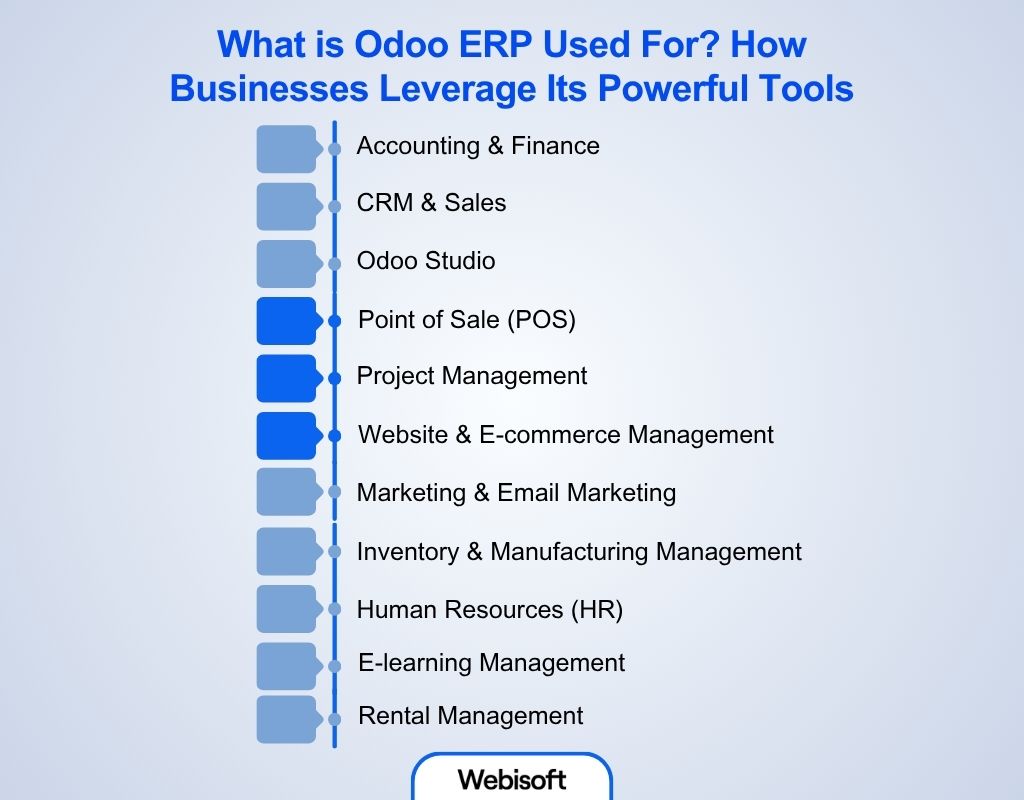 Businesses today need software that simplifies operations, reduces manual work, and provides real-time insights. Odoo ERP is designed to meet these needs with a suite of integrated tools:
Businesses today need software that simplifies operations, reduces manual work, and provides real-time insights. Odoo ERP is designed to meet these needs with a suite of integrated tools:
Accounting & Finance
Businesses can automate bookkeeping, invoicing, and financial reporting, ensuring accuracy while saving time and reducing errors.
CRM & Sales
Companies use Odoo to track leads, manage opportunities, and forecast revenue, helping sales teams prioritize high-value prospects.
Odoo Studio
Organizations can design custom screens, reports, and automated workflows without relying on developers, tailoring the system to their specific processes.
Point of Sale (POS)
Retail businesses can manage transactions efficiently, whether online or offline, streamlining daily sales operations.
Project Management
Teams can allocate resources, track tasks, and monitor project progress, ensuring timely delivery and better collaboration.
Website & E-commerce Management
Businesses build websites, manage online stores, and process orders seamlessly, offering customers a smooth shopping experience.
Marketing & Email Marketing
Companies run automated campaigns across email, social media, and SMS, increasing engagement and driving conversions.
Inventory & Manufacturing Management
Odoo helps businesses track stock, optimize supply chains, and manage production workflows for efficient operations.
Human Resources (HR)
Organizations streamline recruitment, payroll, leave, and timesheet management, improving employee experience and operational efficiency.
E-learning Management
Businesses create and track training programs for employees or clients, supporting growth and knowledge retention.
Rental Management
Companies automate rental workflows, track agreements, and manage billing, reducing administrative overhead. Each of these tools is designed to work together, breaking down data silos and boosting overall productivity. This adaptability makes Odoo ERP system the preferred choice for businesses aiming to modernize operations and scale efficiently.
Odoo ERP Features and Benefits: Why Businesses Choose It
To fully understand what is Odoo ERP, it’s important to explore the core features and benefits that make it the preferred ERP solution for modern businesses.
- Seamless Integration: All Odoo ERP modules work together automatically, sharing data in real-time. This eliminates manual data entry, reduces errors, and ensures consistency across all departments, making operations more efficient.
- User-Friendly Interface: Odoo provides modern dashboards, drag-and-drop functionality, and intuitive navigation. Employees can quickly adapt without extensive training, saving both time and resources.
- Customization & Flexibility: With Odoo Studio, businesses can design custom screens, workflows, and reports tailored to their unique processes. This ensures the ERP adapts to your business, not the other way around.
- Automation Capabilities: Routine tasks like payment reconciliation, inventory updates, lead follow-ups, and marketing triggers can all be automated. This reduces human error and frees staff to focus on strategic activities.
- Real-Time Analytics & Reporting: Instant dashboards and reports provide insights across all operations. Decision-makers can act on accurate, up-to-date information, improving planning and forecasting.
- Cost-Effective Solution: Odoo ERP offers transparent pricing and modular functionality. Businesses only pay for what they need, avoiding the high costs and feature bloat of traditional ERP systems.
- Open-Source Advantage: The open-source nature allows access to the code, fostering innovation and customization. Businesses can leverage community-built extensions or develop their own to meet specific requirements.
These features collectively make Odoo ERP for businesses a versatile and scalable solution for organizations looking to enhance productivity, streamline workflows, and achieve sustainable growth.
Use Cases of Odoo ERP: Industry-Specific Applications That Work
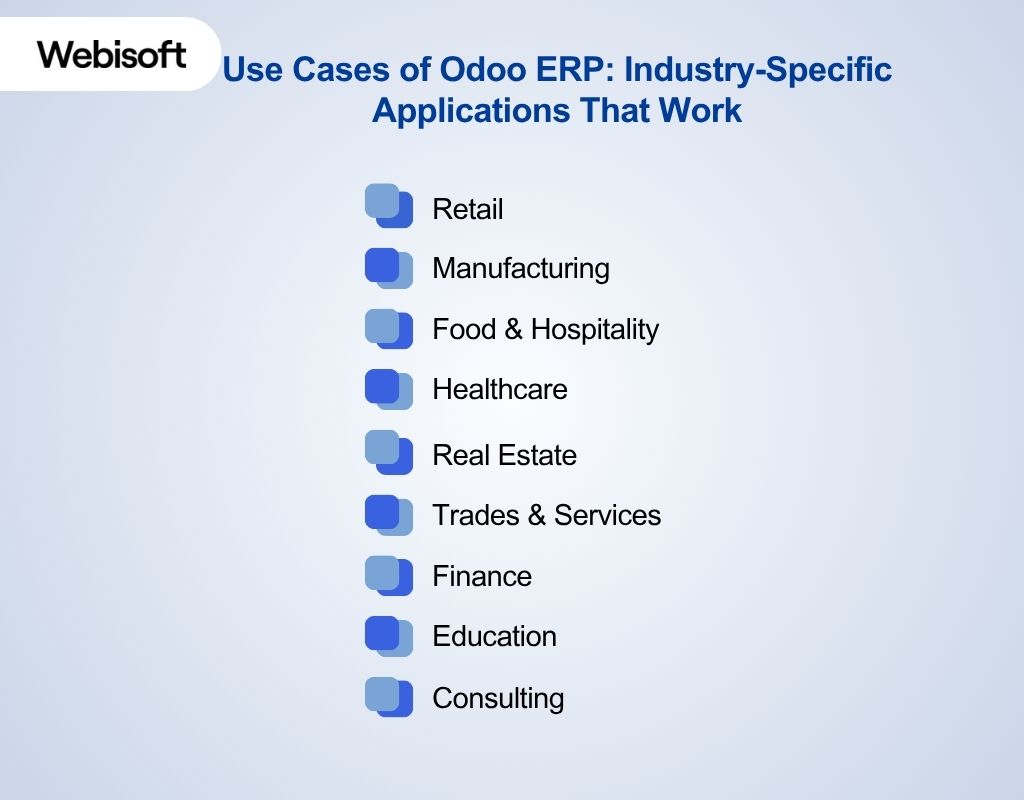 When businesses ask what Odoo ERP is capable of in real-world scenarios, the answer lies in its flexibility and depth across industries.
When businesses ask what Odoo ERP is capable of in real-world scenarios, the answer lies in its flexibility and depth across industries.
Odoo ERP for businesses stands out for its adaptability, allowing companies from various industries to customize modules that perfectly fit their operational needs. Here’s how different industries benefit:
Retail
Odoo ERP streamlines inventory, sales, and point-of-sale operations for retailers. It enables real-time stock tracking, automated reordering, and seamless integration with e-commerce platforms, enhancing customer experience and operational efficiency.
Manufacturing
For manufacturers, Odoo ERP manages production planning, work orders, bills of materials, and quality control. This ensures efficient resource allocation, reduced downtime, and improved overall production output.
Food & Hospitality
Restaurants, cafes, and hotels use Odoo ERP to manage menus, reservations, inventory, and supply chain operations. Automation reduces waste, improves order accuracy, and enhances service quality.
Healthcare
Clinics, hospitals, and healthcare providers leverage Odoo ERP to manage patient records, appointments, billing, and staff schedules. Centralized data ensures better coordination and improved patient care.
Real Estate
Real estate firms use Odoo ERP to track property listings, sales leads, rentals, and client interactions. Integrated project and financial management helps close deals faster while maintaining accurate records.
Trades & Services
Service-based businesses can manage jobs, contracts, invoicing, and customer interactions through Odoo ERP. Automation of scheduling and reporting boosts efficiency and reduces administrative workload.
Finance
Odoo ERP supports accounting, invoicing, bank reconciliation, and expense tracking for financial firms. Real-time reporting and analytics provide better control over cash flow and financial decision-making.
Education
Schools, universities, and e-learning providers can handle student data, course management, attendance, and assessments with Odoo ERP. Integration with online platforms enables smoother learning experiences and streamlined administrative processes.
Consulting
Consulting firms benefit from project management, timesheet tracking, client communications, and invoicing. Odoo ERP ensures that projects are delivered on time and within budget, enhancing client satisfaction.
By addressing the unique challenges of each industry, Odoo ERP for businesses becomes a comprehensive solution that boosts productivity, reduces errors, and improves overall operational efficiency.
Build a Smarter Future with Webisoft’s ERP Development Experts Today!
Book a free consultation, let our team design, develop, and deploy a powerful ERP system tailored to your business growth and operational goals!
Understanding the Odoo ERP System: How It Streamlines Operations
The Odoo ERP system is built to make business management simpler, faster, and more connected. Instead of juggling multiple tools, companies can centralize all critical processes into a single platform. Here’s how Odoo helps streamline daily operations:
- Unified Business Data: Every department- finance, sales, HR, or inventory, works from the same dataset. This reduces errors and ensures everyone has access to accurate, up-to-date information.
- Smart Automation: Routine tasks such as invoicing, order fulfillment, payroll, and lead follow-ups are automated, freeing employees to focus on strategic initiatives.
- Instant Insights with Real-Time Analytics: Odoo dashboards and reporting tools provide live operational insights, enabling managers to make faster and better-informed decisions.
- Improved Collaboration: Teams can easily communicate, share files, and coordinate workflows directly within the platform, reducing bottlenecks and improving efficiency.
- Scalable to Fit Your Business: Odoo grows with your organization. New modules or customized workflows can be added seamlessly as your needs evolve.
By understanding how the Odoo ERP system functions, businesses can see why it’s a preferred solution for organizations seeking efficient, connected, and adaptable operations.
Odoo ERP Modules Explained: A Deep Dive into Each Module
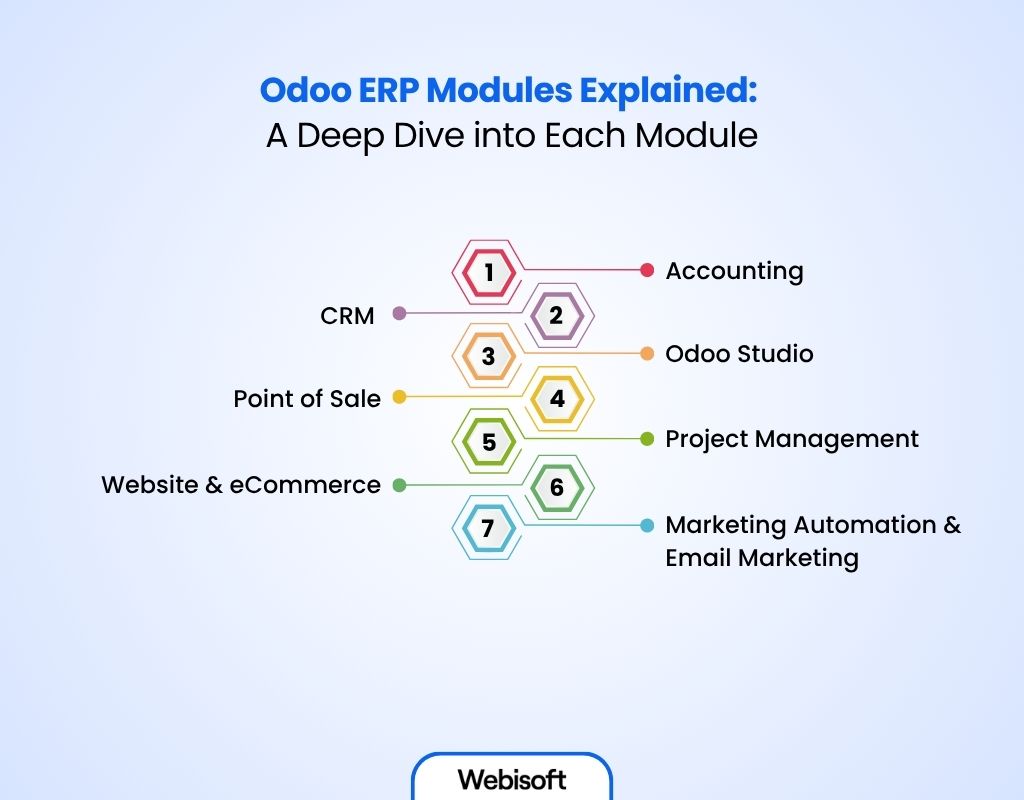 Odoo ERP is more than a collection of tools. It’s a platform designed to empower every aspect of business operations.
Odoo ERP is more than a collection of tools. It’s a platform designed to empower every aspect of business operations.
Each module is crafted to solve specific challenges while seamlessly integrating with the others, allowing businesses to focus on growth rather than juggling multiple systems. Here’s how Odoo supports businesses through its key modules:
Accounting
It keeps finances transparent and accurate. From automated bookkeeping to real-time reporting, businesses can manage invoices, reconcile accounts, and track expenses effortlessly.
CRM (Customer Relationship Management)
It helps businesses nurture leads and convert them into loyal customers. Opportunities can be tracked, high-value prospects prioritized, and customer interactions analyzed in one place.
Odoo Studio
It enables businesses to design custom workflows, screens, and reports without coding. Unique business processes are fully supported according to specific needs.
Point of Sale (POS)
It simplifies retail operations. Offline-ready transactions, integrated inventory updates, and detailed sales insights keep stores running smoothly.
Project Management
It helps businesses plan, assign, and track tasks efficiently. Timelines, resources, and deliverables are always visible, making team collaboration seamless.
Website & eCommerce
It allows businesses to create engaging websites and online stores without technical expertise. From product listings to payment integration, managing an online presence becomes simple.
Marketing Automation & Email Marketing
It automates campaigns that reach the right audience at the right time. Personalized emails, social media outreach, and lead nurturing are managed effortlessly. 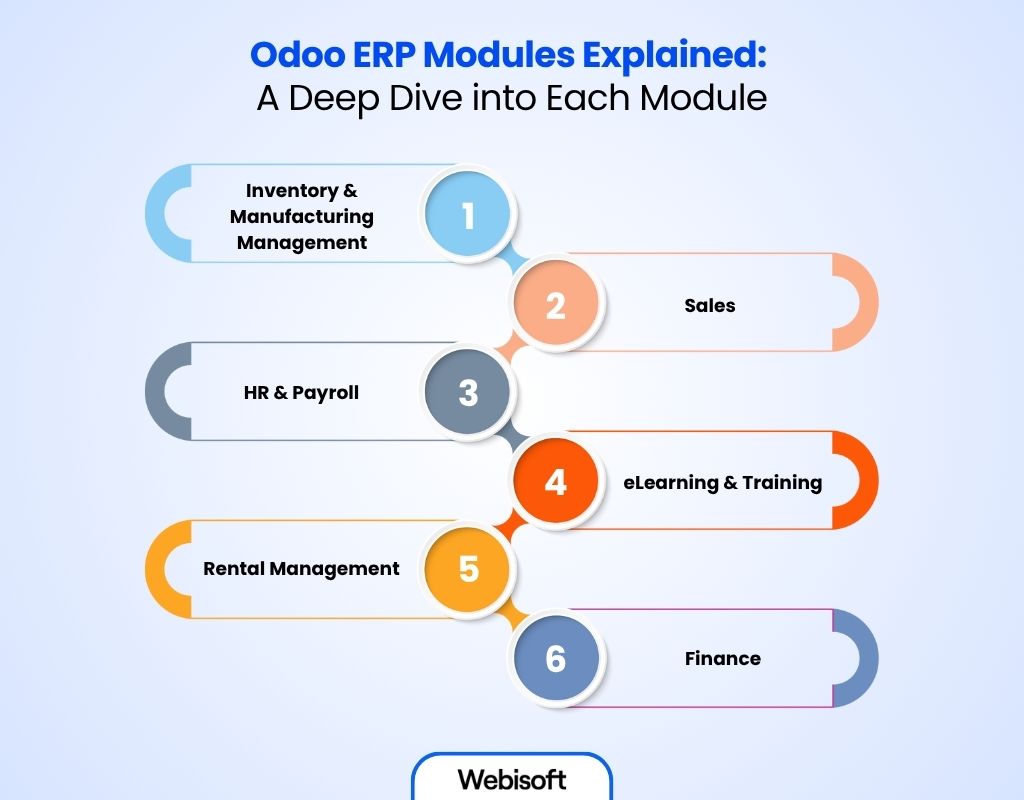
Inventory & Manufacturing Management
It ensures businesses never run out of stock. Real-time tracking, automated reordering, and production management optimize supply chains.
Sales
It streamlines quotations, orders, and pipeline tracking so sales teams can focus on closing deals, not managing paperwork.
HR & Payroll
It simplifies employee management. Recruitment, leave, timesheets, and payroll are integrated, keeping the workforce productive and satisfied.
eLearning & Training
It helps businesses manage courses, track progress, and certify employees, making organizational learning efficient.
Rental Management
It manages reservations, billing, and asset availability, ideal for businesses offering equipment or property rentals.
Finance
It provides a clear overview of cash flow, budgeting, and financial performance, helping strategic decisions be backed by reliable data.
Every module is designed with one goal: to empower businesses by reducing complexity, automating routine tasks, and connecting all operations under one roof.
By leveraging these modules together, businesses gain efficiency, accuracy, and the flexibility to scale without limits.
Odoo ERP Implementation: Step-by-Step Guide for Businesses
Implementing Odoo ERP for businesses ensures they maximize the platform’s efficiency. Here’s a step-by-step overview:
- Assess Business Needs: Identify which modules are essential based on operational priorities and growth goals.
- Plan Implementation: Develop a roadmap, define timelines, allocate responsibilities, and set measurable objectives.
- Data Migration: Transfer existing business data into Odoo ERP while ensuring accuracy and completeness.
- System Configuration: Customize modules using Odoo Studio or settings to match unique workflows and business rules.
- User Training: Train employees to use the system effectively. Interactive tutorials and documentation ensure adoption.
- Testing & Validation: Test workflows, reports, and integrations to ensure the system works seamlessly before going live.
- Go Live & Support: Launch the system and provide ongoing support. Continuous monitoring helps resolve issues and optimize processes.
A structured Odoo ERP implementation reduces disruption, ensures smooth adoption, and allows businesses to start reaping the benefits quickly.
Implementing Odoo ERP can be complex, from module selection to data migration. But that’s where Webisoft comes in.
Our expert team streamlines the entire process so your business can focus on what truly matters: growth and efficiency. Ready to transform your operations? Talk to Webisoft’s specialists today.
Why Choose Open-Source ERP Software Like Odoo for Your Business
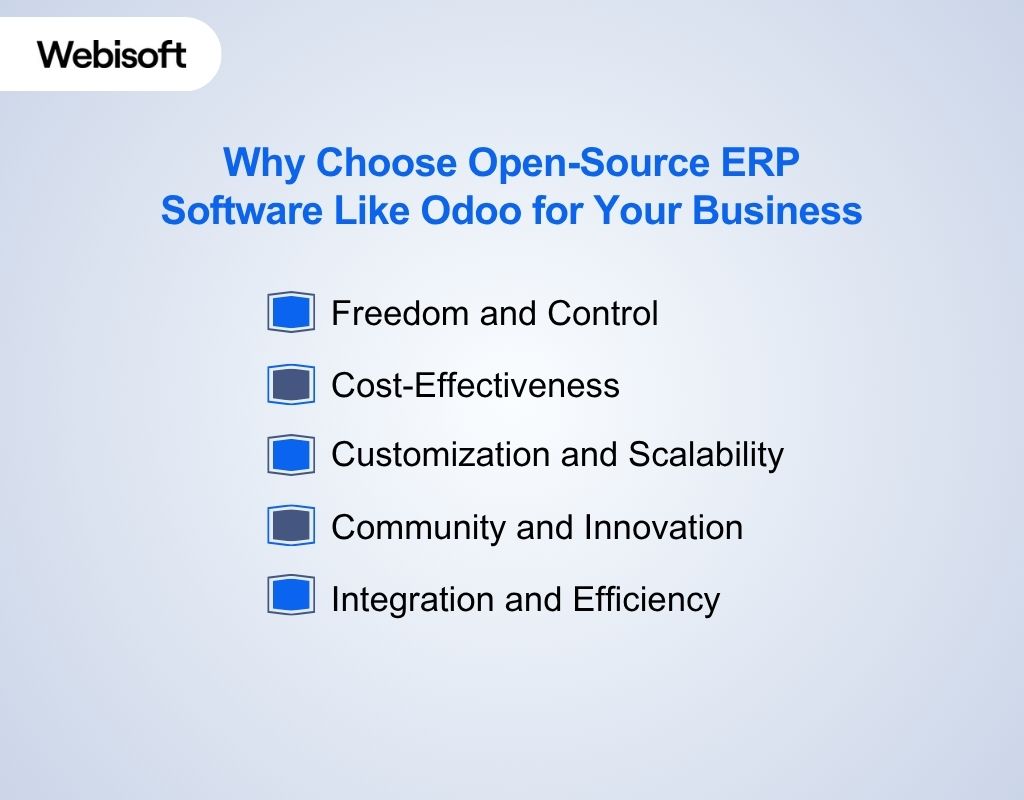 Many decision-makers exploring what Odoo ERP is soon realize that its open-source foundation delivers exactly what modern businesses seek. flexibility, transparency, and control.
Many decision-makers exploring what Odoo ERP is soon realize that its open-source foundation delivers exactly what modern businesses seek. flexibility, transparency, and control.
As an open-source ERP software, Odoo empowers companies to fully own their data, customize their workflows, and operate without the constraints of proprietary systems.
Freedom and Control
Unlike proprietary systems, Odoo allows businesses to host on their own servers or use cloud infrastructure, giving complete control over data, customization, and integrations.
Cost-Effectiveness
Open-source ERP eliminates unnecessary licensing fees and feature-based upselling. Companies pay only for what they need, making Odoo an affordable option for SMEs and large enterprises alike.
Customization and Scalability
Businesses can adapt the ERP to their unique workflows using Odoo Studio, APIs, and thousands of community-built modules. This flexibility ensures the software grows alongside the organization.
Community and Innovation
With a global community of 100,000+ developers, Odoo benefits from continuous improvements, bug fixes, and new modules, keeping businesses ahead in innovation without high development costs.
Integration and Efficiency
Open-source architecture allows seamless integration with other business tools. Companies can unify operations, reduce redundant data entry, and gain real-time insights across departments.
Choosing an open-source ERP like Odoo ensures businesses have control, flexibility, and continuous innovation, key advantages in today’s competitive market.
What Makes Odoo ERP Different and Better Than Traditional ERPs?
| Feature | Odoo ERP | Traditional ERP | Why It Matters for Businesses |
| Cost Structure | Transparent, single price per user | Often expensive with hidden fees | Businesses avoid surprise costs and pay only for what they use |
| Flexibility | Fully customizable with Odoo Studio and open-source code | Limited customization, often rigid | Companies can adapt workflows without extra cost or delay |
| Integration | Seamless integration across all modules | Often requires third-party connectors | Reduces duplicate work and improves data accuracy |
| Deployment | Cloud, on-premise, or Odoo.sh managed platform | Usually only on-premise or vendor-hosted | Businesses choose what fits their infrastructure and strategy |
| Innovation | Community-driven development, frequent updates | Slower updates, limited innovation | Businesses stay up-to-date with modern features and security |
| User Experience | Modern, intuitive, fast interface | Often complex and unintuitive | Employees adopt the system faster, reducing training costs |
| Vendor Lock-In | No proprietary formats, full access to source code | Proprietary formats restrict control | Businesses retain control and can switch providers if needed |
This comparison highlights why Odoo ERP has become a preferred choice for modern businesses seeking efficiency, control, and scalability over traditional ERP systems.
Odoo ERP Limitations: What Users Should Know Before Adoption
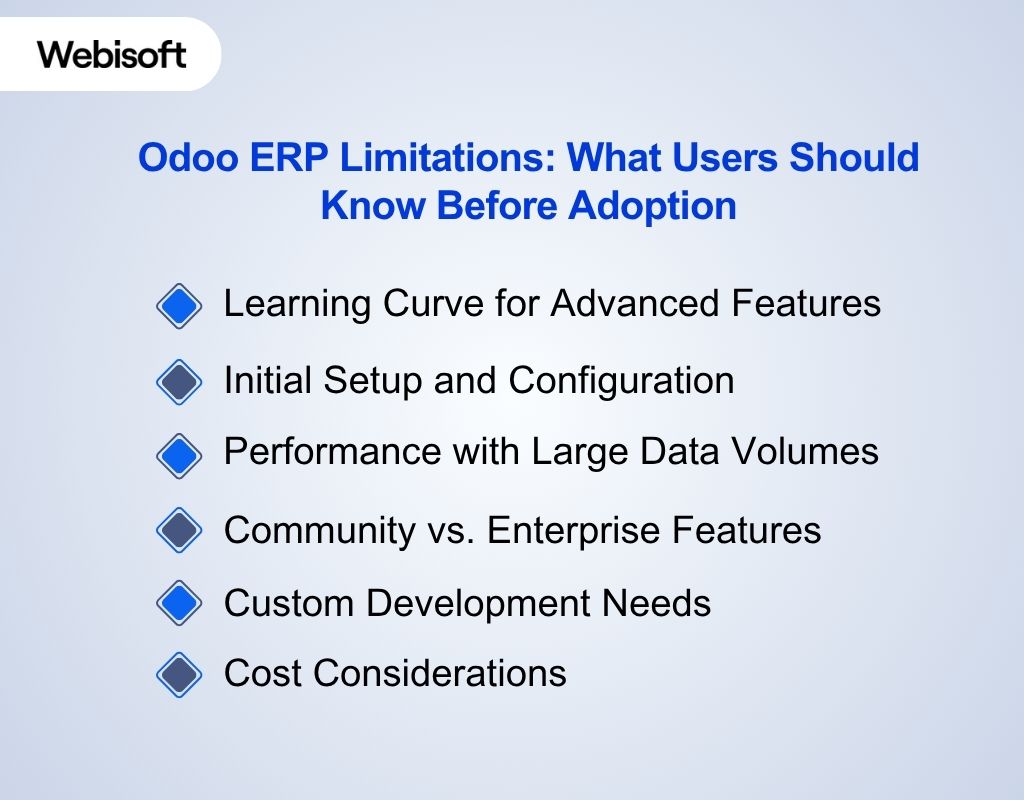 While Odoo ERP offers tremendous flexibility and functionality, businesses should be aware of some limitations before adopting it:
While Odoo ERP offers tremendous flexibility and functionality, businesses should be aware of some limitations before adopting it:
Learning Curve for Advanced Features
Although the interface is intuitive, some advanced modules or customizations require technical knowledge or support, which may challenge smaller teams without IT expertise.
Initial Setup and Configuration
Businesses may need time and planning to configure Odoo modules optimally. Complex workflows or multi-department integrations can require consulting or professional assistance.
Performance with Large Data Volumes
While Odoo is fast and efficient, extremely large datasets or highly complex manufacturing processes may need optimized hosting and database management to maintain top performance.
Community vs. Enterprise Features
The Community Edition is free but lacks some advanced features and official support, while the Enterprise Edition comes with a cost. Businesses must evaluate which edition fits their operational needs.
Custom Development Needs
Highly specialized requirements may require additional development or third-party apps, which can add to implementation costs and project timelines.
Cost Considerations
While Odoo offers transparent pricing, the total cost of ownership can increase with Enterprise features, additional modules, third-party apps, and necessary consulting for setup. Businesses need to plan for both immediate and long-term expenses.
Understanding these limitations allows businesses to plan ahead, ensuring a smoother Odoo ERP implementation and maximizing its benefits without surprises.
Should You Get Odoo ERP for Your Business? Pros and Cons Explained
If you’re still wondering what is Odoo ERP and whether it fits your business model, weighing its pros and cons will help you make a confident decision. Here’s a clear look at the pros and cons:
Pros:
- Comprehensive Business Solution: Odoo covers nearly all business operations, from accounting and CRM to manufacturing and e-learning.
- Flexible and Scalable: Businesses can start small with essential modules and scale up as needed.
- Open-Source Advantages: Companies retain control over their data, workflows, and integrations.
- Cost-Effective: Transparent pricing ensures no hidden fees or surprise costs.
- Seamless Integration: Reduces manual data entry, eliminates silos, and improves decision-making with real-time insights.
Cons:
- Requires Setup and Planning: Proper configuration is essential to unlock full potential.
- Technical Knowledge for Advanced Features: Some customizations or complex modules may require developer support.
- Potential Additional Costs: Enterprise features, hosting optimization, or third-party integrations may add to expenses.
Bottom Line: For businesses seeking digital transformation, operational efficiency, and integrated workflows, Odoo ERP is a robust solution.
By weighing the pros and cons, companies can make an informed choice about whether Odoo ERP aligns with their strategic goals.
Unlock the Full Potential of Odoo ERP with Webisoft
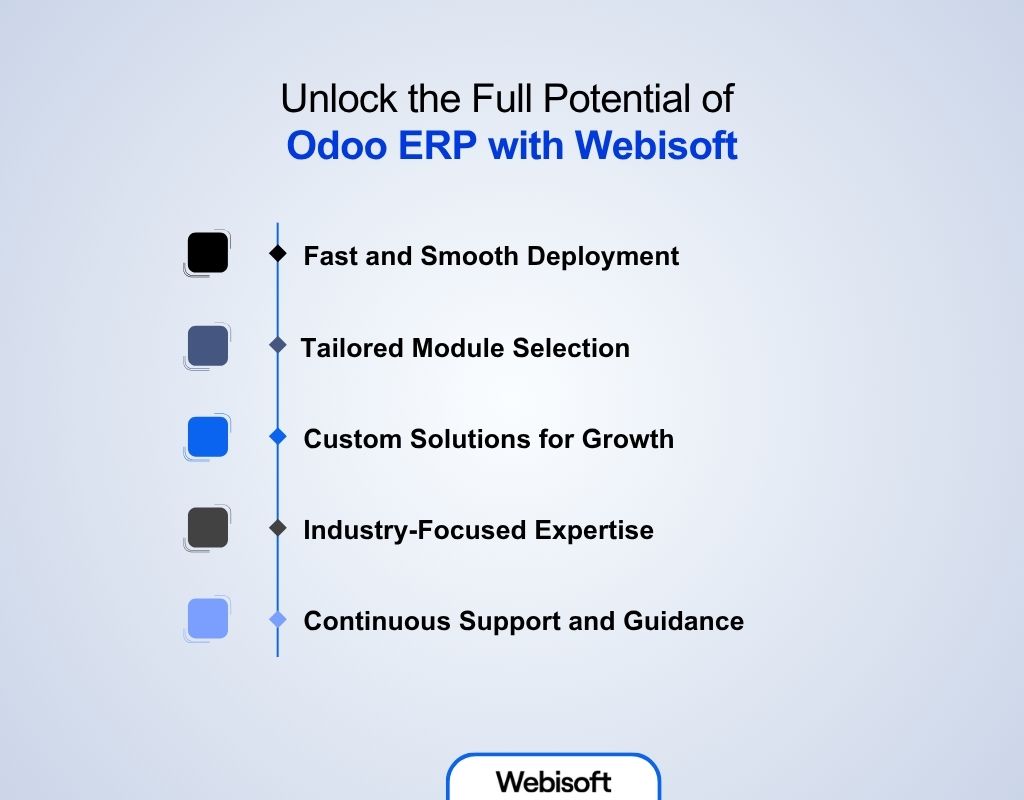 Implementing Odoo ERP can be overwhelming without the right expertise. Webisoft, as a trusted Odoo development partner, helps businesses deploy, customize, and optimize Odoo efficiently, turning it into a tool that drives real results.
Implementing Odoo ERP can be overwhelming without the right expertise. Webisoft, as a trusted Odoo development partner, helps businesses deploy, customize, and optimize Odoo efficiently, turning it into a tool that drives real results.
Fast and Smooth Deployment
We handle setup, data migration, and testing with precision, ensuring your business can start benefiting from streamlined operations sooner.
Tailored Module Selection
We analyze your workflows and implement the modules and optimizations your business truly needs. This ensures cost-effective adoption and maximum value from every feature.
Custom Solutions for Growth
When off-the-shelf options aren’t enough, we develop custom features and workflows built to scale with your organization, keeping your ERP agile and future-ready.
Industry-Focused Expertise
Our experience spans multiple sectors, including retail, manufacturing, finance, healthcare, and education, delivering solutions that fit your industry’s unique requirements.
Continuous Support and Guidance
We provide training, upgrades, and ongoing support to ensure your system evolves alongside your business goals, maintaining efficiency and impact over time.
Businesses across industries trust Webisoft because we combine deep technical expertise with a results-driven approach. From analyzing workflows to implementing custom solutions and providing ongoing support, we ensure your systems and processes align perfectly with your growth goals.
Partnering with us means faster deployment, smarter optimizations, and tools that truly empower your team. Don’t let complexity slow your business.
Book a call with Webisoft today and start transforming your operations with solutions designed to scale, streamline, and drive real impact.
Build a Smarter Future with Webisoft’s ERP Development Experts Today!
Book a free consultation, let our team design, develop, and deploy a powerful ERP system tailored to your business growth and operational goals!
Conclusion
In today’s fast-paced business environment, understanding what is Odoo ERP and how it functions is crucial for companies aiming to streamline operations and drive growth.
Whether you are a small enterprise seeking efficiency or a large organization aiming for digital transformation, adopting Odoo ERP can be a game-changer.
Take the step today to optimize your operations and unlock the full potential of your business.
FAQs
1. Why should my business choose Odoo ERP?
Businesses choose Odoo ERP for its modular design, scalability, automation capabilities, real-time reporting, seamless integration between apps, and transparent pricing model.
2. How much does Odoo ERP cost?
Odoo ERP costs vary depending on the edition (Community or Enterprise), the number of users, and the selected modules. Its all-inclusive pricing ensures no hidden fees or feature upselling.
3. Is Odoo ERP suitable for small businesses?
Yes, Odoo ERP is highly flexible and modular, making it ideal for small businesses. Companies can start with essential modules and expand as their needs grow.
4. How long does it take to implement Odoo ERP?
Implementation timelines depend on business size, number of modules, and customization needs. With expert support, companies can go live faster and ensure smoother adoption.
5. Can Odoo ERP be customized for specific business needs?
Absolutely. Odoo ERP allows businesses to design custom workflows, reports, screens, and automation rules, ensuring the platform fits unique operational requirements.
6. Which industries benefit most from Odoo ERP?
Odoo ERP serves diverse industries including retail, manufacturing, healthcare, education, food and hospitality, finance, real estate, and consulting, helping each streamline operations and boost efficiency.


